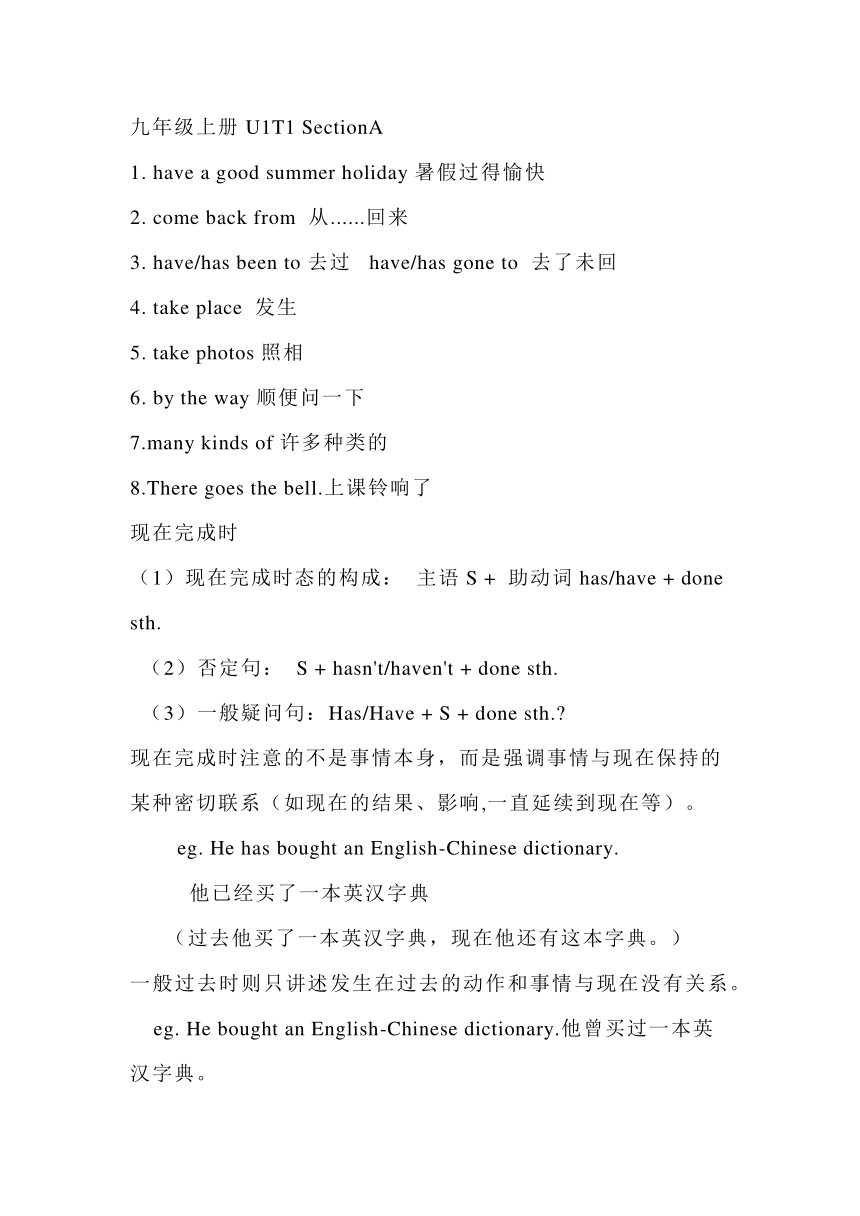
九年级上册U1T1 SectionA 1. have a good summer holiday暑假过得愉快 2. come back from 从......回来 3. have/has been to 去过 have/has gone to 去了未回 4. take place 发生 5. take photos 照相 6. by the way 顺便问一下 7.many kinds of许多种类的 8.There goes the bell.上课铃响了 现在完成时 (1)现在完成时态的构成: 主语S + 助动词has/have + done sth. (2)否定句: S + hasn't/haven't + done sth. (3)一般疑问句:Has/Have + S + done sth. 现在完成时注意的不是事情本身,而是强调事情与现在保持的某种密切联系(如现在的结果、影响,一直延续到现在等)。 eg. He has bought an English-Chinese dictionary. 他已经买了一本英汉字典 (过去他买了一本英汉字典,现在他还有这本字典。) 一般过去时则只讲述发生在过去的动作和事情与现在没有关系。 eg. He bought an English-Chinese dictionary.他曾买过一本英汉字典。 九年级上册U1T1 SectionB 1. 很长一段时间for a long time 2. 参加(活动) take part in 3. 残疾儿童养育院disabled children’s home 4. 一次精彩的经历a wonderful experience 5. 向……学习(许多)learn (a lot) from... 6. 没有时间做某事have no time to do sth. 7. 一个有意义的假期 a meaningful holiday 8. 跳绳 jump rope 语法: 1. You took part in some volunteer activities during the summer holidays, didn’t you 你在暑假期间参加了一些志愿者活动,不是吗? 此句为反意疑问句,即附加疑问句。由两部分构成: 前一部分是对事物的陈述。后一部分是简略的问句,表示说话人对前面事实没有把握,需要对方证实,一般译为“是吗”“对吗?”反意疑问部分,谓语动词在人称和时态上与陈述句部分保持一致。 主语要用代词(主格)。 反意疑问句遵循的基本规则为:前肯后否;前否后肯。 即前半句(陈述部分)若用肯定形式,后半句(疑问部分)就用否定形式;反之亦然。eg.It’s a nice day, isn’t it 九年级上册U1T1 SectionC 1. 亲眼看见 see sth. oneself 2. 在20世纪60年代 in the 1960s = in the 1960’s 3. 生活条件 living conditions 4. 在那时back then 5. 与某人保持联系 keep in touch with sb. 6. 改革开放 the reform and opening-up 7. 满足某人的需要satisfy one’s needs 8. 而且,还有what’s more 9. 成功地做某事 succeed in (doing) sth. 语法: since “自从......以后/以来”, 其后与表示过去的时间副词或从句连用,可与“for+一段时间”互换,提问也用how long。其结构为: 现在完成时+since+过去的时间点或动作/从句(从句用一般过去时)。 eg. I've not seen her since she left the city. (对画线部分提问) _How long haven’t you seen her He has been like this for two weeks. (同义替换) = He has been like this __since___ 2 weeks ago. 区别: for+时间段 since+时间点/时间段+ago/+从句(一般过去时) 九年级上册U1T1 SectionD 1. 休闲活动 leisure activites 2. 在某方面发挥重要作用/扮演重要角色 play an important part/role in sth. 3. 在过去 in the past 4. 相聚 get together 5. 玩捉迷藏游戏play hide-and-seek 6. 打牌/下棋play cards/chess 7. 在某人的空闲时间in one’s spare/free time 8. 各种各样的 various/all kinds of 9. 到国外旅游 make a tour abroad = tour abroad 现在完成时 用法:表示过去发生或已经完成的某一动作对现在造成的影响或结果。 构成:助动词have/has + 动词的过去分词 (1) 肯定句:主语+have/has +过去分词+其它 e.g. We have seen the film. (2) 否定句:主语+haven’t/hasn’t +过去分词+其 ... ...
~~ 您好,已阅读到文档的结尾了 ~~

